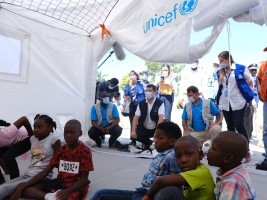|
||||||||||||||||||
| Download the revised decree and electoral calendar, published in the official journal |
|
|
Haiti - UNICEF : Out of $73,3M emergency aid requested for Haiti, less than 11% have been received 19/09/2021 11:19:00
More than one month after a 7.2 magnitude earthquake jolted southwest Haiti, an estimated 650,000 people, including 260,000 children, still need urgent humanitarian assistance, UNICEF warned today. "Children in Haiti are still struggling to come to terms with the aftermath of an earthquake that caused their homes, schools, health facilities and entire communities to crumble," said Jean Gough, UNICEF Regional Director for Latin America and the Caribbean. "Health services remain largely disrupted in Southwestern Haiti. Many hospital buildings are either damaged or destroyed. Many families with children are fearful of seeking treatment at the few health facilities left standing. Limited access to safe water and basic health services is putting young lives at risk." Health systems are struggling to keep up with the needs, with 12,763 people injured https://www.haitilibre.com/en/news-34681-haiti-earthquake-latest-assessment-of-civil-protection.html and an estimated 82 health facilities in the most affected departments damaged or destroyed. Even a month on, some rural communities remain unable to access functional health facilities due to infrastructure damage. Limited health care capacity presents elevated health risks —such as wound infection and risk of tetanus. The lack of routine health care services has increased the risk of maternal and newborn deaths, as many maternity and surgical wards do not meet the criteria for safe deliveries. The ability of health authorities to prevent, identify and treat malnutrition has also been weakened by the earthquake. In response to these increased needs, UNICEF is working with partners to provide essential medicines, medical supplies and equipment and nutritional commodities, support the resumption of health care services for damaged or destroyed health centers, and strengthen health supply chain management. UNICEF has equipped 24 mobile clinic teams with essential medical equipment and medicines to provide integrated health and nutrition services – including the identification and treatment of acute malnutrition – in remote communes. "If families with children cannot access health facilities after the earthquake, it’s critical to bring lifesaving health services to them so we can prevent child deaths,” said Gough. "UNICEF is setting up more mobile clinics on the ground to keep children healthy. With thousands of families and children in urgent need of medical attention, we cannot wait for the health facilities to be rebuilt." Other key health results to date include the following : 50,000 people reached with essential medical supplies for a period of three months in 19 main hospitals involved in victims’ emergency care. 300,000 people received Personal Protective Equipment (PPE) for a period of three months. In infant and maternal health, UNICEF is prioritizing the continuation of primary health care for children and women, in close coordination with the Ministry of Health and the World Health Organization (WHO). Over the next six months, UNICEF will support the provision of essential health and nutrition services targeting over 251,000 children and women, including the delivery of essential supplies to treat common childhood illnesses. Other health interventions that will be scaled up include the expansion of routine immunization coverage for 35,000 children, the identification and treatment of acutely malnourished children, programmes in support of infant and young child feeding and nutrition supplementation to prevent malnutrition and the provision of maternal, newborn and childcare. UNICEF will also support the reconstruction and reparation of 30 damaged hospitals and primary care centres, as well as the training of 3,000 healthcare facility staff and community health workers in infection prevention and control (IPC), including the continuation of COVID-19 prevention and the provision of personal protective equipment (PPE). UNICEF is requesting US$73.3 million to respond to the humanitarian needs due to the earthquake, focusing on providing urgent support in health, education, WASH, nutrition and child protection, including gender-based violence (GBV), over the next six months. To date, less than 11 per cent has been received. See also : https://www.haitilibre.com/en/news-34681-haiti-earthquake-latest-assessment-of-civil-protection.html HL/ HaitiLibre
|
|
|
Why HaitiLibre ? |
Contact us |
Français
Copyright © 2010 - 2026 Haitilibre.com |





